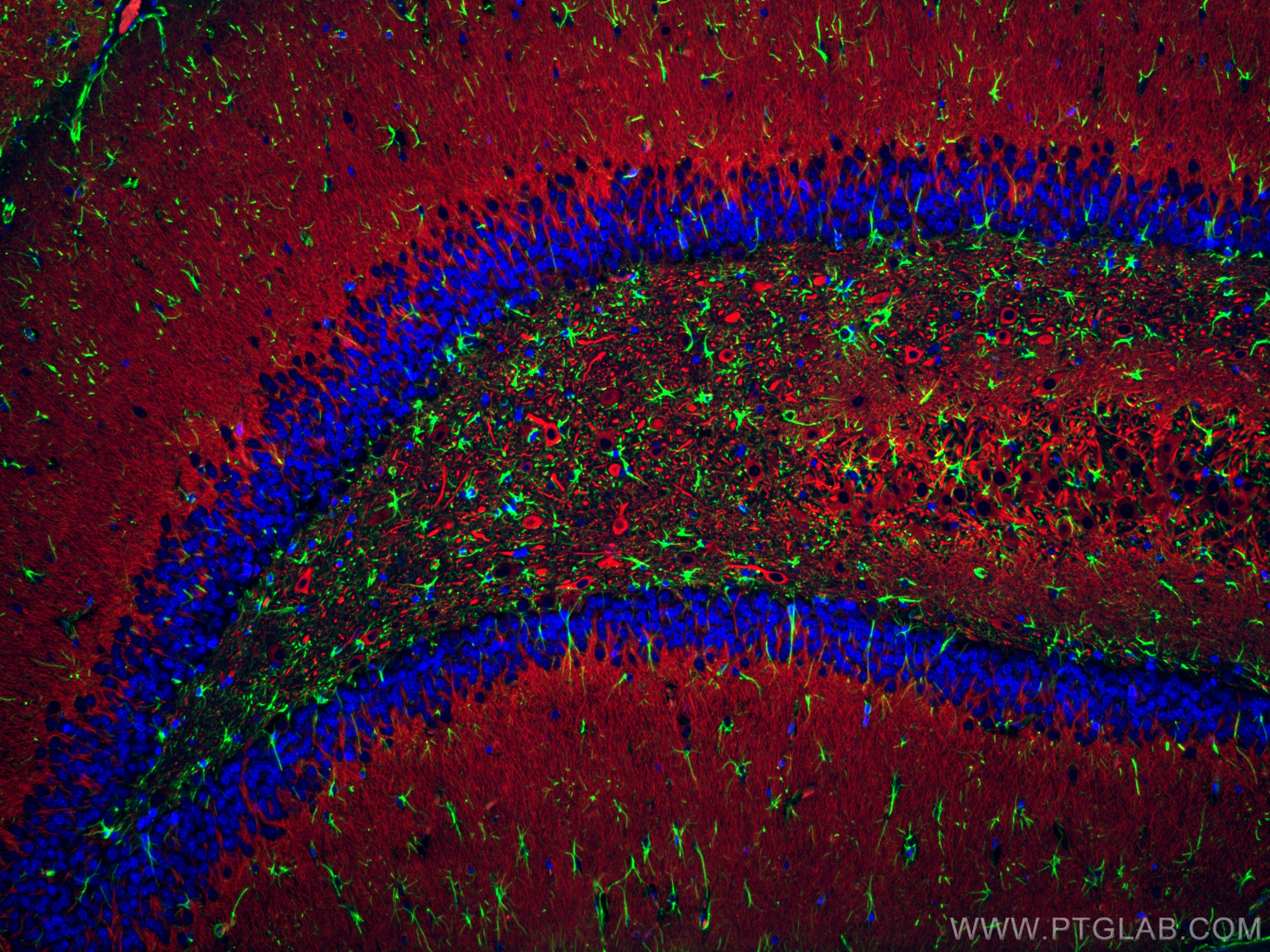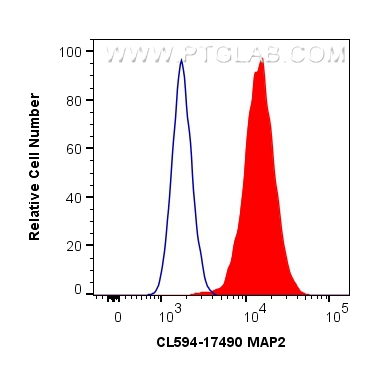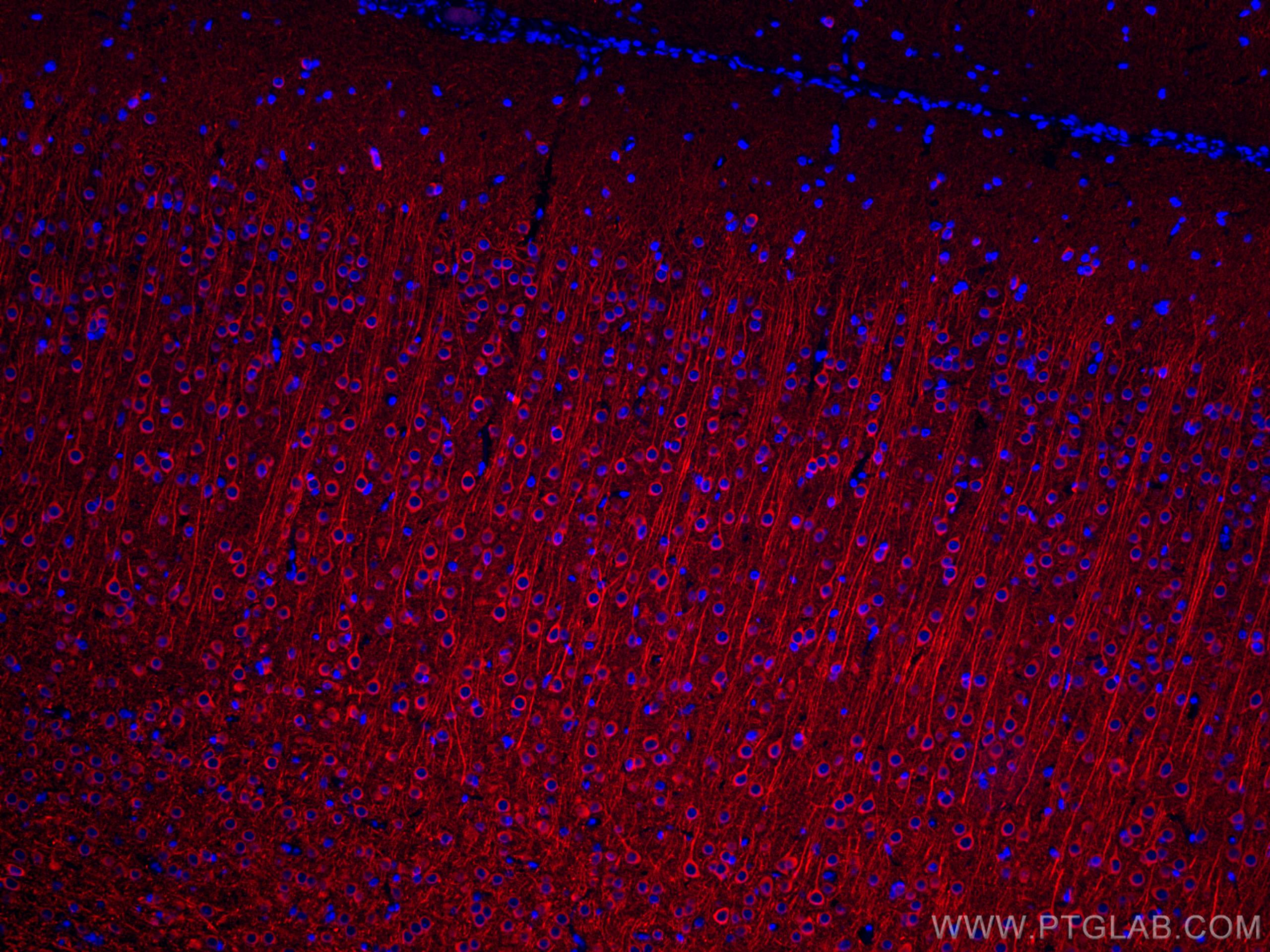CoraLite®594-conjugated MAP2 Polyclonal antibody
MAP2 Polyclonal Antibody for IF-P, FC (Intra)
Host / Isotype
Rabbit / IgG
Reactivity
human, mouse, rat
Applications
IF-P, FC (Intra) and More (1)
Conjugate
CoraLite®594 Fluorescent Dye
验证数据展示
经过测试的应用
| Positive IF-P detected in | rat brain tissue |
| Positive FC (Intra) detected in | Neuro-2a cells |
推荐稀释比
| Application | Dilution |
|---|---|
| Immunofluorescence (IF)-P | IF-P : 1:50-1:500 |
| Flow Cytometry (FC) (INTRA) | FC (INTRA) : 0.40 ug per 10^6 cells in a 100 µl suspension |
| It is recommended that this reagent should be titrated in each testing system to obtain optimal results. | |
| Sample-dependent, Check data in validation data gallery. | |
发表文章中的应用
| IF | See 1 publications below |
产品信息
CL594-17490 targets MAP2 in IF-P, FC (Intra) applications and shows reactivity with human, mouse, rat samples.
| Tested Applications | IF-P, FC (Intra) Application Description |
| Cited Applications | IF |
| Tested Reactivity | human, mouse, rat |
| Cited Reactivity | rat |
| Immunogen | MAP2 fusion protein Ag11580 种属同源性预测 |
| Host / Isotype | Rabbit / IgG |
| Class | Polyclonal |
| Type | Antibody |
| Full Name | microtubule-associated protein 2 |
| Synonyms | Microtubule-associated protein 2, MAP2C, MAP2B, MAP2A, MAP-2 |
| Calculated Molecular Weight | 200 kDa |
| GenBank Accession Number | BC038857 |
| Gene Symbol | MAP2 |
| Gene ID (NCBI) | 4133 |
| RRID | AB_2919842 |
| Conjugate | CoraLite®594 Fluorescent Dye |
| Excitation/Emission Maxima Wavelengths | 588 nm / 604 nm |
| Form | Liquid |
| Purification Method | Antigen affinity purification |
| UNIPROT ID | P11137 |
| Storage Buffer | PBS with 50% Glycerol, 0.05% Proclin300, 0.5% BSA, pH 7.3. |
| Storage Conditions | Store at -20°C. Avoid exposure to light. Stable for one year after shipment. Aliquoting is unnecessary for -20oC storage. |
背景介绍
Microtubule-associated protein 2 (MAP2) is a tubulin binding protein regulating the spacing and stability of microtubules and contributing to elongation of dendrites.
What is the molecular weight of MAP2? Is MAP2 post-translationally modified?
MAP2 has multiple isoforms that arise from alternative splicing (PMID: 3121794, 7854050, and 10383434). They are classified into two groups - MAP2A and MAP2B, which are known as high molecular weight (HMW) isoforms, run as ~280 kDa species, while low molecular weight (LMW) isoforms MAP2C and MAP2D are around ~70 kDa. MAP2 proteins are heavily phosphorylated, which contributes to a large discrepancy between their predicted and observed molecular weight in SDS-PAGE (220 vs 280 kDa for HMW forms).
What is the tissue expression pattern of MAP2? What is the subcellular localization of MAP2?
MAP2 isoforms differ in their tissue and developmental expression pattern (PMID: 2469170 and 3898077). In the brain, MAP2B is widely expressed during and post development, MAP2A is expressed postnatally, while MAP2C is present only in the early development except of present in photosensitive cells of the adult retina and in the olfactory system. MAP proteins are highly expressed in the CNS found in cell bodies and dendrites of neurons, in dorsal root ganglion, reactive glia, and in the testis (PMID: 9588626). In neurons, MAP2 proteins are found in the cell body and dendrites, where they associate with microtubules, while they can also be present in the nuclei of testicular cells.
Can MAP2 be used as a neuronal marker?
MAP2 proteins are abundantly expressed in neurons. MAP2 is frequently used as a dendritic marker because it is present in the cell body and dendrites of neurons but absent in axons (PMID: 28413822).
实验方案
| Product Specific Protocols | |
|---|---|
| IF protocol for CL594 MAP2 antibody CL594-17490 | Download protocol |
| FC protocol for CL594 MAP2 antibody CL594-17490 | Download protocol |
| Standard Protocols | |
|---|---|
| Click here to view our Standard Protocols |
发表文章
| Species | Application | Title |
|---|---|---|
Biomolecules Interplay between Energy Supply and Glutamate Toxicity in the Primary Cortical Culture |




